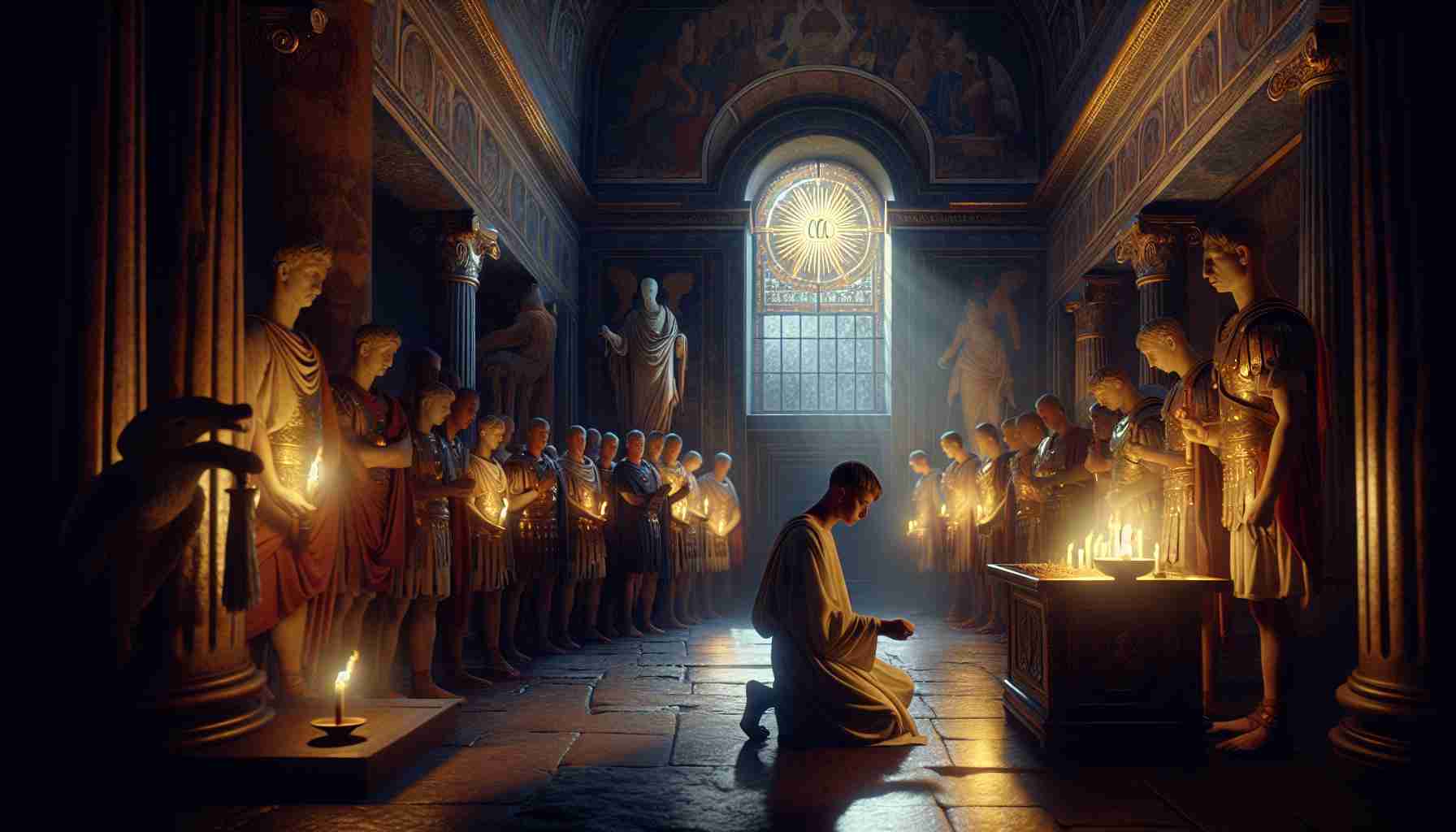

A bitter wind curled through the narrow streets of Eboracum as the city held its breath. Clouds brooded low over the Roman fortress in the north of Britannia, where torches crackled against the damp gloom. In the chamber where the emperor’s remains lay, the air was heavy with incense and silence. Flavius Valerius Constantius Chlorus, Caesar of the Western Roman Empire, was dead.
Gathered beneath the painted ceilings and marble busts stood the legions—disciplined and battle-weary—waiting for a word. One word. A name.
Only moments before, Constantius had spoken through labored breaths, grasping the hand of his son, Constantine. Soldiers whispered that even as shadow overran the Emperor's face, his eyes fixed on the youth beside him—not with fear, but with purpose.
Outside, the assembled ranks of armored men stretched like a living wall down the stone-clad via. No imperial herald made the proclamation. No senate decree. A roar broke forth, primal as thunder, from ten thousand throats:
“Ave, Imperator Constantine!”
Thus, on July 25, in the year 306, in the mist-picked outpost of York, a Christian emperor was chosen—though none yet knew how deeply heaven would mark his reign.
The son of a Greek Christian mother, Helena—whose voice often echoed the words of the scrolls, “He changes times and seasons, deposes kings and raises up others...” (Daniel 2:21)—Constantine had grown in the shadow of distant gods. Mars and Sol still held their temples in Rome. The eagles still bore the standards of Jupiter. Yet Helena’s faith, quiet and stubborn as stone, had remained like a lamp behind his eyes.
Six years passed. The empire fractured under the weight of rival claimants and layered betrayals. From frontier to forum, Rome’s might trembled. Then in the year 312, the gods became silent.
The night before the battle at the Milvian Bridge, Constantine’s legions camped on the northern banks of the Tiber. Across the river Maxentius waited—holding the city gates, eager to crush his rival beneath imperial steel. But Constantine did not only see his enemy that night.
As dusk bled into darkness, he walked alone among the pine shadows, his tunic heavy with dust and sweat. What appeared in the sky was no star. Not the omen of Mars. But a burning sign—crossed, glimmering—and the words “In hoc signo vinces.” In this sign, you will conquer.
He rose the next morning and marked every shield in his army with a new emblem: the unfamiliar Greek letters Chi-Rho, interlaced like a divine cipher. Some mocked. Others prayed. When the battle fell, it fell like thunder over marble halls. And Constantine’s banner did not break.
Rome opened its gates not to the son of Mars, but to the sign of the crucified Christ.
The next year, with Licinius, he would sign the Edict of Milan. Pins were lifted from prison doors. Cristians flooded both sunlit basilicas and dark catacombs where their martyrs still slept in perfumed shrouds. The state that had once nailed Peter to a cross was now forced to listen to his gospel.
Even the stones of Rome began to shift.
In Nicomedia, in Antioch, and most notably at Nicaea, Constantine did not only wield the sword of empire but summoned bishops to councils, seeking unity from the bitter schism of Arius and Athanasius. At Nicaea in 325, beneath frescoed domes, the Nicene Creed was born.
“Of one substance with the Father…”
The palace halls echoed with debate not of tribute or conquest, but of divinity. Through Constantine’s urging, orthodoxy took form with parchment and prayer.
And yet, there were whispers.
Some murmured that his baptism came too late—done on his deathbed, in the waters of Nicomedia. Others questioned if his vision had been real, or the cleverly timed fear of war. A few said his tolerance was political, not piety—after all, he still minted coins with Sol Invictus long after the cross adorned his standards.
But beneath the marble slabs of Constantinople where his body would lie, alongside apostles in the Church of the Holy Apostles, faith and empire had sewn a bond no riot could unthread.
What Constantine understood, perhaps by Helena’s whispered teachings—or perhaps carved into his mind by that burning vision—was that Caesar could raise walls, but only Christ raised the dead.
A century later, the empire he reforged would falter. But the Church he freed would march on.
Even now, on the old Roman walls in York, moss creeps between the stones where once a divine mandate was spoken not in temples, but among soldiers. The wind still howls through the barracks, and sometimes it seems to carry a voice—not of empire, but of providence.
And in the stone silence, Daniel’s old words remain: “He changes the times and the seasons; He removes kings and raises up kings…”
Sometimes, even with a vision in the sky.